Sea Cucumbers: Silent Victims of Climate Change
Sea cucumbers, the unassuming custodians of marine ecosystems, are facing increasing threats from the mounting impacts of climate change. These bottom-dwelling creatures, essential for maintaining ocean health, are particularly vulnerable to the warming waters, ocean acidification, and habitat destruction resulting from climate shifts. Belize recently reopened its sea cucumber industry, and in the following story, Hipolito Novelo looks at the impacts of climate change on an already vulnerable industry.
Hipolito Novelo, Reporting
Sea cucumbers play a critical role in marine environments. Often referred to as the “vacuum cleaners of the ocean floor,” they consume detritus, breaking down organic matter and recycling nutrients. This process enhances sediment health, facilitates carbon cycling, and maintains the overall balance of coral reef and seagrass ecosystems. Assistant Professor at the University of Belize, Dr. Arlenie Rogers has been researching sea cucumbers for many years. She’s the resident expert.

Dr. Arlenie Rogers
Dr. Arlenie Rogers, Assistant Professor, University of Belize
“Sea cucumbers are very important in the marine environment because they are detritus feeders, meaning they feed from the seafloor. And while they feed in the seafloor, they eat decomposed material from the seafloor. So, in a way, they’re cleaning the seafloor, and while they are feeding, they are eating sediment from the seafloor, and when they excrete that, it is sand, so they oxygenate the seafloor as well. So that is the benefit of providing the environment. They also host many symbionts on their bodies. So they are like a microhabitat for many marine organisms like polyworms, gastropods, bivalves, algae, and many microorganisms.”
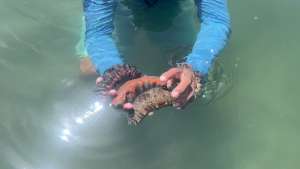 The Belize sea cucumber fishery reopened on September 1 and is set to close in January 2025. This reopening follows a year-long closure in 2022, during which a stock assessment was conducted by the Belize Fisheries Department and the University of Belize. Completed in March 2023, the assessment evaluated populations in five critical areas, including Placencia Lagoon, through stratified random sampling. The survey identified more than 249,800 lbs of sea cucumber. To safeguard the species and promote sustainability, the annual harvest quota was capped at 175,000 lbs for four approved exporters.
The Belize sea cucumber fishery reopened on September 1 and is set to close in January 2025. This reopening follows a year-long closure in 2022, during which a stock assessment was conducted by the Belize Fisheries Department and the University of Belize. Completed in March 2023, the assessment evaluated populations in five critical areas, including Placencia Lagoon, through stratified random sampling. The survey identified more than 249,800 lbs of sea cucumber. To safeguard the species and promote sustainability, the annual harvest quota was capped at 175,000 lbs for four approved exporters.

Rigoberto Quintana
Rigoberto Quintana, Acting Fisheries Administrator
“So, compared to I think the last fishery was probably in 2018, I think, and then we had a closure because of the densities, the population going down. But there has been a recovery of the stocks, and there was a joint stock assessment conducted by the University of Belize and the Fishery Department. And those studies are recommending a total quota of around 175,000 pounds. That is the basis of opening the sea cucumber fishery. We’ll monitor the quota. It opens the 1st of September. And once that process is realized, we will close the fishery. As you know, the processing of sea cucumbers does not take a lot of processing, mostly cooking and drying. So, we’re doing some inspections. This we can see if they are prepared, and it might not be that before we’ll be prepared, they also have to get certification from BAHA.”
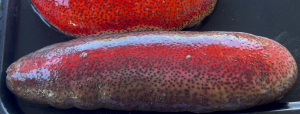 Sea cucumbers are highly sought after in global markets, particularly in Asia, for their culinary and medicinal value. This demand supports the livelihoods of coastal communities, including those in Belize. The industry represents a significant economic opportunity, described as a “multi-million-dollar business” and “very lucrative”. These creatures are not as abundant as before. In the Placencia lagoon, where Dr. Rogers was accompanied by Dr. Xochitl Clare of the University of Washington, finding them proved to be a task.
Sea cucumbers are highly sought after in global markets, particularly in Asia, for their culinary and medicinal value. This demand supports the livelihoods of coastal communities, including those in Belize. The industry represents a significant economic opportunity, described as a “multi-million-dollar business” and “very lucrative”. These creatures are not as abundant as before. In the Placencia lagoon, where Dr. Rogers was accompanied by Dr. Xochitl Clare of the University of Washington, finding them proved to be a task.

Dr. Xochitl Clare
Dr. Xochitl Clare, University of Washington
“Sea cucumbers represent a really important fishery species here in Belize as one of our exports overseas to China, Japan, and other Asian markets.Sea cucumbers are a huge export. They’re an unusual animal. We don’t find them on the Belizean plate very much. But because they make so much money as an export value, they represent a very important resource in the Caribbean at large, not just Belize.”
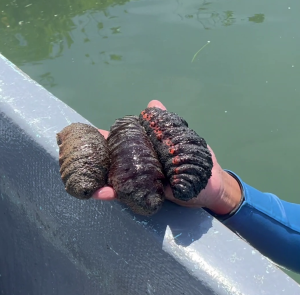 Sea cucumbers are not immune to climate change. Rising ocean temperatures disrupt their metabolic processes. This leads to reduced reproductive success and higher mortality rates, especially in tropical regions where prolonged heatwaves can decimate populations and destabilize ecosystems. Ocean acidification, driven by increased atmospheric CO₂ absorption, impairs their ability to produce calcium carbonate structures critical for survival while also reducing the availability of detrital matter, their primary food source. Habitat destruction from coral bleaching and seagrass bed degradation exacerbates these challenges and exposes sea cucumbers to predators and limits breeding grounds.
Sea cucumbers are not immune to climate change. Rising ocean temperatures disrupt their metabolic processes. This leads to reduced reproductive success and higher mortality rates, especially in tropical regions where prolonged heatwaves can decimate populations and destabilize ecosystems. Ocean acidification, driven by increased atmospheric CO₂ absorption, impairs their ability to produce calcium carbonate structures critical for survival while also reducing the availability of detrital matter, their primary food source. Habitat destruction from coral bleaching and seagrass bed degradation exacerbates these challenges and exposes sea cucumbers to predators and limits breeding grounds.
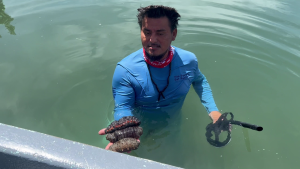 Dr. Arlenie Rogers
Dr. Arlenie Rogers
“Sea cucumbers, they tend to reproduce; they are very active during the dry months. And if the temperatures are extreme in the dry months, then, you know, we can see monthly how the temperature changes. And how temperature can potentially affect their reproduction in both the rainy and the dry seasons, because when they reproduce in the dry season, they tend to recover and reproduce again the following year. But if the temperature is increasing tremendously, both in the rainy and in the dry season, and the cool months in December, we don’t know, then we can make projections; we can look at how temperature extremes can affect their reproduction.”
To address the impacts of climate change on sea cucumbers, immediate and collaborative efforts are essential. Enhanced conservation measures, such as the establishment and enforcement of marine protected areas, are critical to safeguarding their habitats. Sustainable harvesting practices must also be implemented, with strict regulations and monitoring systems to prevent overfishing, which the fisheries department has done. Investing in research to understand species-specific vulnerabilities can inform effective climate adaptation strategies. Sea cucumbers may seem small and inconspicuous, but their role in maintaining ocean health is profound. Their survival is intrinsically tied to the larger fight against climate change. Reporting for News 5, I am Hipolito Novelo.





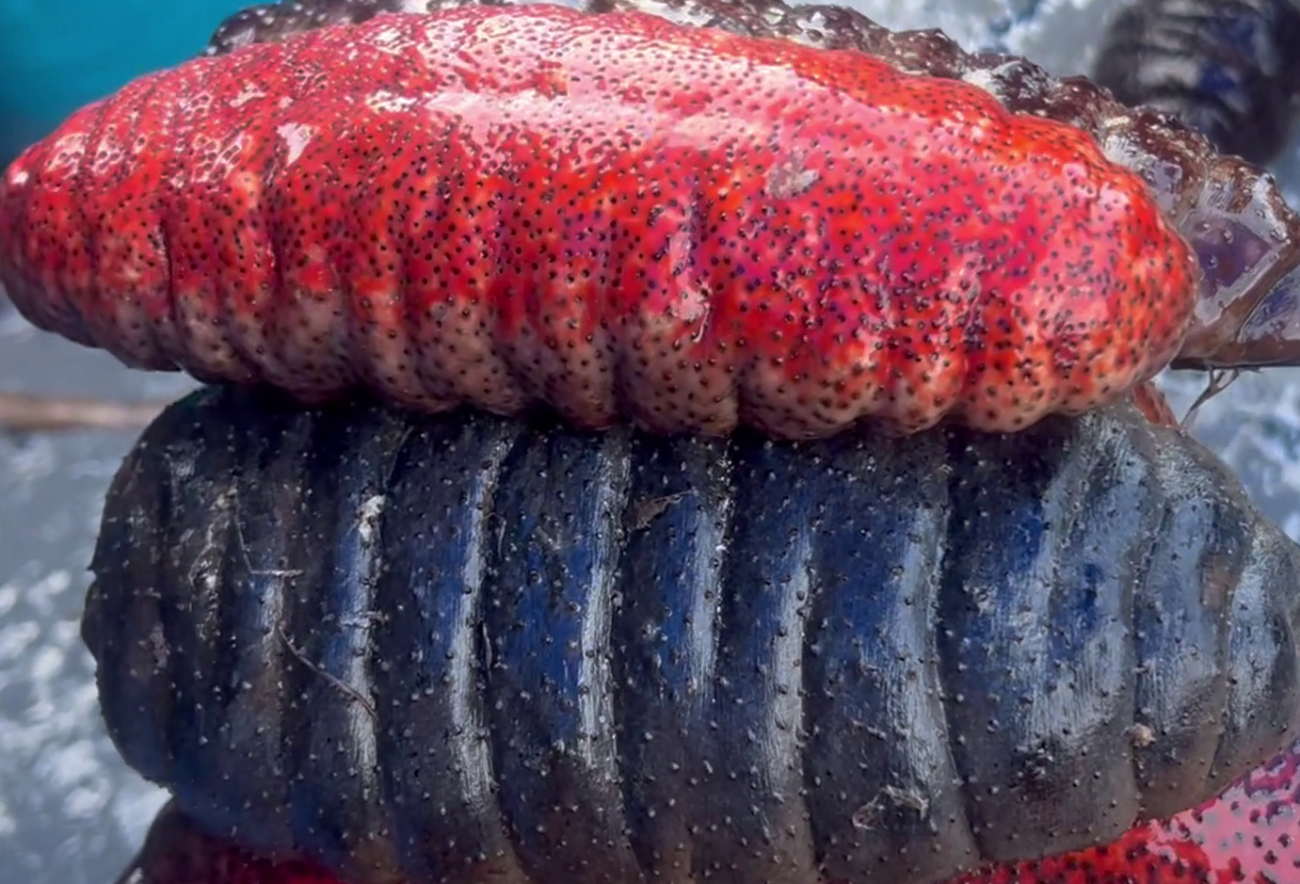

Facebook Comments